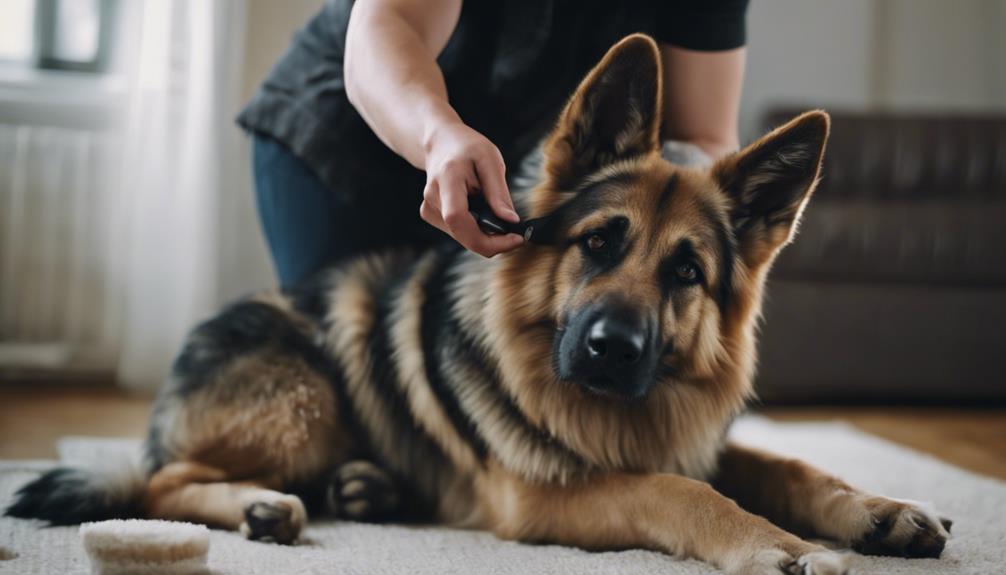🐾 Paw-some Partnership Alert! 🐾
As a pack of German Shepherd enthusiasts at MixGermanShepherd.com, we're always sniffing out the best products for our furry friends. Guess what? When you fetch something from Amazon through our links, we earn a little treat! 🦴
Imagine a loyal German Shepherd mix, facing mobility challenges and relying on your care for comfort. Understanding their unique needs and adapting your home environment can make a world of difference in their quality of life. From specialized diets to creating a supportive network, every aspect of caring for a disabled pup requires thoughtful consideration. Let's explore the essential strategies that can help you provide the best possible care for your furry companion, ensuring they thrive despite their limitations.
Key Takeaways
- Seek vet consultation for tailored care plans and mobility solutions.
- Create a safe home environment with adapted surroundings for comfort.
- Focus on specialized nutrition and regular vet check-ups for health.
- Provide mental stimulation and personalized pain management for quality of life.
Understanding Your Dog's Disabilities
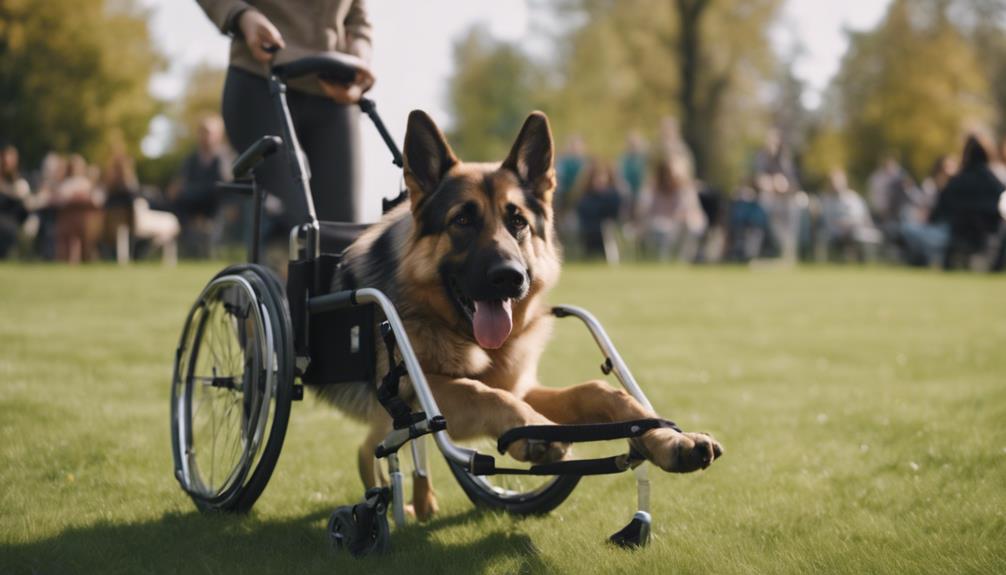
To properly care for your disabled German Shepherd mix, it is crucial to first understand the specific disabilities affecting your furry companion through consultation with a veterinarian. By seeking professional guidance, you can gain insights into how these disabilities impact your dog's health and daily life. Knowing the effects will allow you to make informed decisions on how to best support and accommodate your German Shepherd mix within your home environment.
Veterinary consultation is key in determining the extent of your dog's disabilities and establishing a foundation for tailored care. Understanding the challenges your furry friend faces will help you create a safe and nurturing space at home. Whether it's mobility issues, dietary restrictions, or other concerns, being aware of the disabilities enables you to adapt your surroundings to meet your German Shepherd mix's unique needs. Together with your vet, you can develop a comprehensive care plan that addresses exercise routines, dietary adjustments, and any other necessary modifications to enhance your dog's quality of life.
Assessing Mobility Needs and Solutions
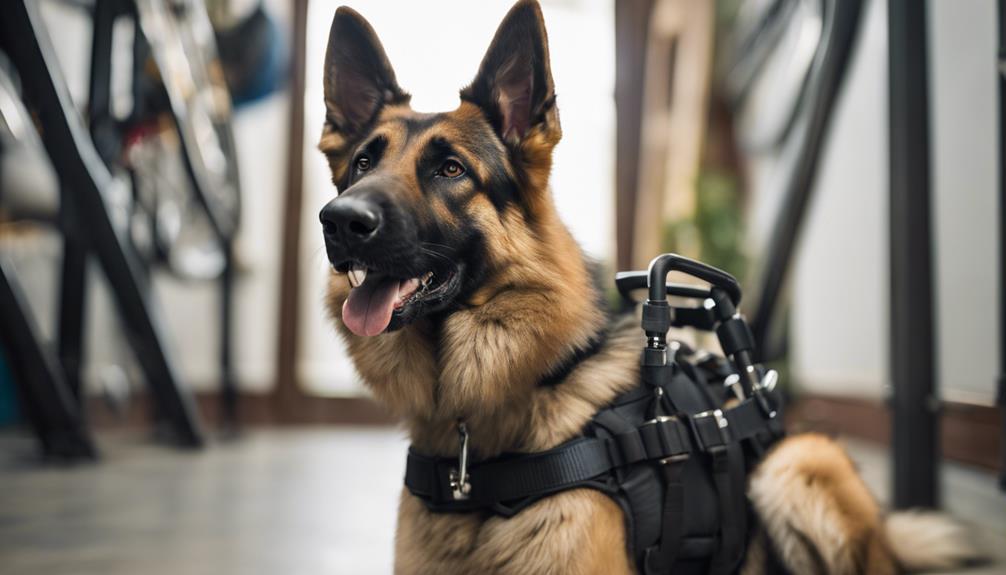
Understanding your disabled German Shepherd mix's mobility needs is crucial for providing appropriate care and support. Start by observing how your dog moves and what limitations they face. If your German Shepherd mix struggles with mobility, consider exploring options like wheelchairs, braces, or harnesses to assist them in getting around comfortably. Consulting with a veterinarian or specialist is key to determining the most suitable mobility aid for your dog's specific condition. Once you've chosen an aid, introduce it gradually, allowing your dog time to adjust through training and practice. Keep a close eye on your furry friend's comfort and mobility levels with the aid in place to ensure their well-being and quality of life. By actively assessing and addressing your disabled German Shepherd mix's mobility needs, you can help them navigate the world with greater ease and confidence.
Creating a Safe Home Environment

Creating a safe home environment for your disabled German Shepherd mix involves thoughtful adjustments to ensure their comfort and ease of movement. To provide the best care for your furry companion, consider the following:
- Install Ramps: Set up ramps in areas where your dog needs to navigate different levels, such as doorways or stairs. Ramps will help your German Shepherd mix move around more easily and reduce strain on their body.
- Use Non-Slip Flooring: Opt for non-slip flooring to prevent your dog from slipping or getting injured. This type of flooring provides better traction, especially for a disabled pet who may struggle with stability.
- Create Wider Pathways: Clear pathways of any obstacles and make them wider to accommodate your dog's movement. Wider pathways allow your disabled German Shepherd mix to move freely without feeling restricted or at risk of bumping into furniture.
Specialized Diet and Feeding Tips

When caring for your disabled German Shepherd mix, it's crucial to focus on a specialized diet tailored to their health needs, such as joint support or weight management. Consult with a veterinarian to establish the right feeding schedule and portion sizes to maintain your dog's healthy weight. Using elevated or slow feeder bowls can aid in comfortable eating and prevent digestive issues.
Dietary Restrictions Overview
To ensure optimal health for your disabled German Shepherd mix, it is essential to tailor their diet according to their specific health requirements and restrictions. When considering dietary restrictions for your beloved pet, keep the following in mind:
- Consult a Professional: Work closely with your veterinarian to establish the appropriate specialized diet that aligns with your German Shepherd mix's health needs.
- Implement Feeding Tips: Practice portion control, establish scheduled mealtimes, and steer clear of harmful ingredients to promote your dog's well-being.
- Consider Specialized Diets: Explore options like prescription diets, hypoallergenic formulas, or nutrient-rich meals designed to address your dog's condition effectively.
Mealtime Schedule Importance
Establishing a consistent mealtime schedule for your disabled German Shepherd mix is crucial for maintaining routine and supporting proper digestion. Specialized diets may be necessary based on your dog's health needs and dietary restrictions. Consult with a veterinarian to create a customized feeding plan tailored to your dog's unique requirements. It's important to monitor your dog's weight and adjust portion sizes accordingly to prevent obesity or malnourishment. Utilizing feeding puzzles or slow-feed bowls can promote mental stimulation and prevent rapid eating, especially for dogs with mobility issues. By adhering to a structured mealtime schedule, you not only provide stability for your furry companion but also contribute to their overall well-being through proper digestion and nutrition.
Skin and Coat Care Strategies

Regularly grooming and bathing your disabled German Shepherd mix is essential for maintaining their skin and coat health. To ensure you are taking the best care of your furry friend, consider the following strategies:
- Use Gentle Products: Opt for gentle, hypoallergenic shampoos when bathing your disabled German Shepherd mix to prevent skin irritation and maintain a healthy coat.
- Regular Brushing: Brushing your dog's coat regularly not only helps prevent matting but also promotes circulation, which is beneficial for a disabled German Shepherd mix's skin health.
- Consult a Veterinarian: Seeking advice from a veterinarian is crucial in determining the most suitable skin and coat care products for your disabled German Shepherd mix. Veterinarians can recommend specific products tailored to your dog's needs and address any skin issues that may arise.
Exercise and Physical Therapy Regimen
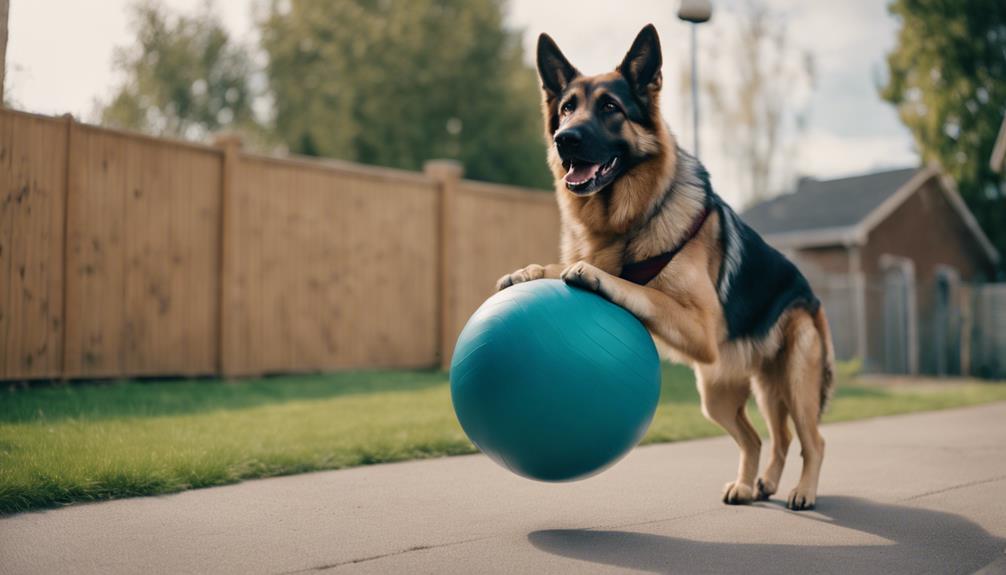
When caring for a disabled German Shepherd mix, ensuring a tailored exercise and physical therapy regimen is crucial for maintaining their overall well-being and mobility. It's important to implement a customized exercise plan that focuses on low-impact activities like swimming and gentle walks to help maintain muscle tone and joint flexibility. Additionally, incorporating physical therapy sessions can significantly improve your dog's range of motion, muscle strength, and overall mobility. To provide mental stimulation and enrichment, interactive toys and puzzle games can be used during these activities.
| Exercise Plan | Physical Therapy |
|---|---|
| – Low-impact activities like | – Improve range of motion |
| swimming and gentle walks | and muscle strength |
| – Monitoring progress closely | – Enhance overall mobility |
| – Adjusting regimen as needed | – Consult with a veterinarian |
| – Catering to specific needs | or rehabilitation specialist |
Remember to monitor your dog's progress diligently during exercise and therapy sessions, making adjustments as necessary to cater to their special needs and abilities. Consulting with a veterinarian or canine rehabilitation specialist can help create a comprehensive program tailored to your disabled German Shepherd mix's condition.
Mental Stimulation and Enrichment Activities
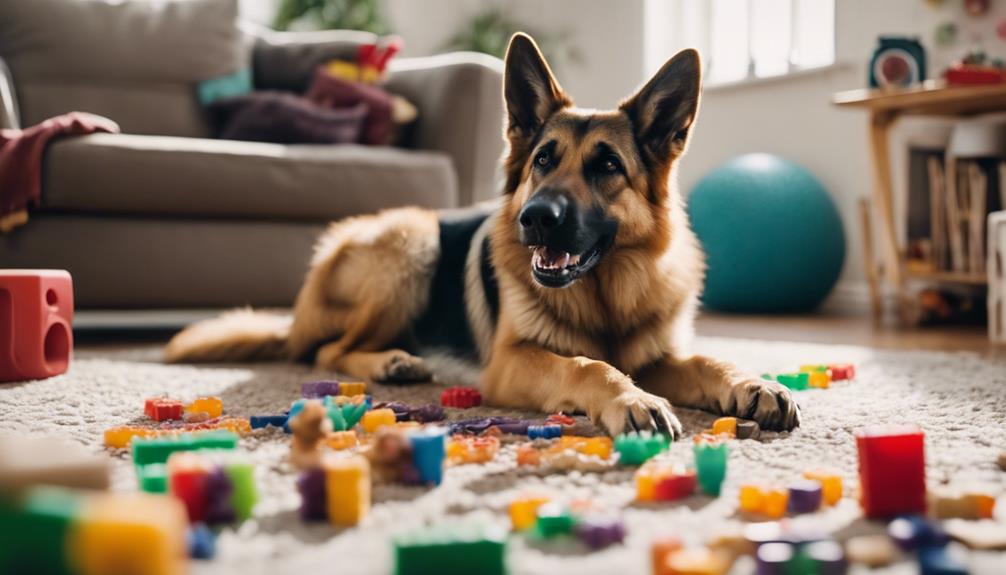
To provide mental stimulation and enrichment for your disabled German Shepherd mix, engage them in puzzle toys and interactive games to keep their mind active and stimulated. Here are some activities you can incorporate into your routine:
- Puzzle Toys: Introduce puzzle toys that require your dog to think and problem-solve to access treats or toys hidden inside. This mental challenge can help keep their cognitive abilities sharp and provide hours of entertainment.
- Interactive Games: Play interactive games like hide-and-seek with treats or toys to engage your dog's senses and keep them mentally stimulated. This not only provides mental exercise but also strengthens the bond between you and your furry friend.
- Scent Work Activities: Engage your dog in scent work activities by hiding treats around the house or yard for them to find using their keen sense of smell. This type of mental enrichment taps into their natural instincts and provides a rewarding and mentally stimulating experience for your pup.
Managing Pain and Discomfort

You should pay close attention to any signs of pain or discomfort your disabled German Shepherd mix may exhibit, like increased whimpering or restlessness. It's important to work closely with your vet to create a personalized pain management plan that suits your dog's unique needs. Making adjustments to ensure your dog's environment is comfortable and providing regular vet check-ups are crucial steps in managing your dog's pain effectively.
Pain Management Strategies
For effective pain management strategies for your disabled German Shepherd mix, tailor a specialized plan to address their specific needs and condition. Here are some key steps to help manage your dog's pain and discomfort:
- Consult with a veterinarian: Work closely with a vet to determine the most suitable pain relief options, taking into account factors like age, size, and overall health status.
- Monitor pain levels: Regularly assess your dog's pain levels and be prepared to adjust the pain management strategies as necessary to ensure their comfort.
- Utilize a variety of approaches: Combine medication, physical therapy, and alternative therapies to alleviate your dog's pain and promote overall well-being.
Comfortable Environment Adjustments
Adjusting your disabled German Shepherd mix's environment to ensure comfort and alleviate pain is essential for their well-being. Provide orthopedic bedding and supportive cushions to reduce pressure points and ease your dog's discomfort. Create a cozy space with soft blankets and heating pads to soothe any aches they may have. Using non-slip mats or rugs can prevent falls and help your furry friend move around safely. Consider incorporating specialized ramps or steps to assist them in reaching elevated surfaces without straining their joints. By regularly checking and adjusting their environment, you can ensure optimal comfort and minimize pain for your disabled German Shepherd mix. These small adjustments can make a big difference in enhancing your dog's quality of life.
Regular Vet Check-Ups
Regular vet check-ups play a critical role in managing pain and discomfort for your disabled German Shepherd mix. During these visits, veterinary assessments are conducted to monitor your dog's condition and adjust treatment plans accordingly. Pain management strategies, such as recommending medication or physical therapy, can be discussed and implemented to alleviate any discomfort your furry companion may be experiencing. By attending these check-ups regularly, any worsening symptoms or new issues can be detected early, allowing for timely interventions to be put in place. Consistent veterinary care not only helps in managing pain but also enhances the overall quality of life for your disabled German Shepherd mix.
Regular Veterinary Check-ups and Care
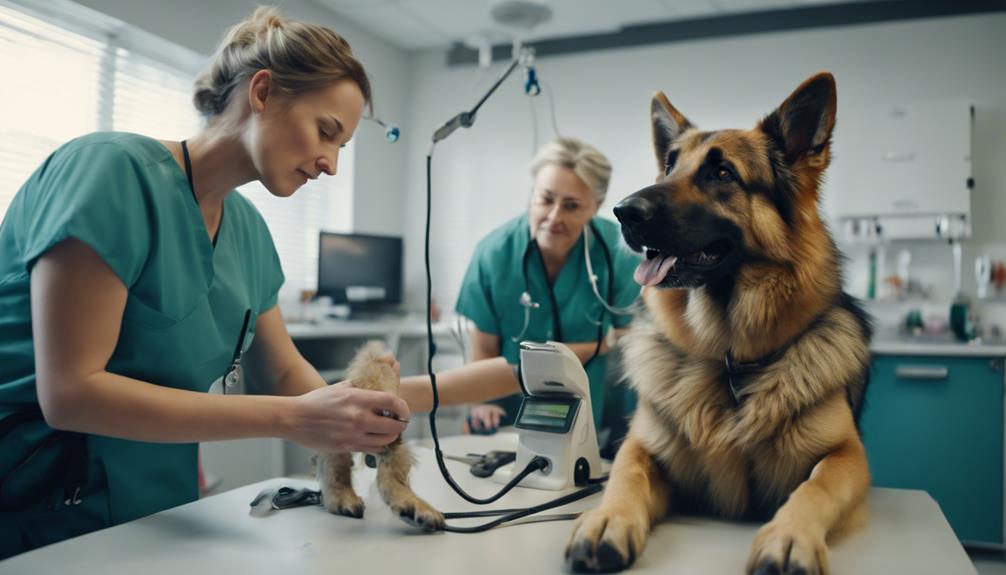
Ensuring your disabled German Shepherd mix receives consistent veterinary check-ups is essential for maintaining their health and well-being. Regular veterinary check-ups play a crucial role in monitoring your dog's overall health and detecting any changes early on. These check-ups enable prompt intervention and treatment, which are vital for managing your dog's specific disability effectively.
Your veterinarian can offer specialized treatments, medications, or therapies tailored to your dog's needs, ensuring they receive the best care possible. By staying proactive with veterinary care, you can help enhance your dog's quality of life and ensure their comfort, mobility, and longevity despite their disability.
Consistent veterinary check-ups are not just about addressing current issues but also about preventing future complications. Your vet can provide valuable guidance on how to best support your disabled German Shepherd mix, helping you navigate their unique health challenges with expertise and compassion. By prioritizing regular veterinary care, you are actively investing in your dog's well-being and happiness.
Building a Support Network

You can start building a strong support network for your disabled German Shepherd mix by finding local resources, engaging in online support groups, and seeking professional guidance options. These avenues can provide you with valuable insights, emotional support, and practical advice to help you navigate the challenges of caring for a disabled pet. By connecting with others who understand your situation, you can create a network of support that will benefit both you and your furry companion.
Finding Local Resources
When caring for a disabled German Shepherd mix, establishing a support network through local resources is crucial for providing the best possible care and assistance. Here are three steps to help you build a strong network:
- Research local veterinary clinics and animal hospitals that have experience in handling the specific needs of disabled dogs.
- Reach out to nearby animal shelters or rescues for advice on caring for your disabled German Shepherd mix and to explore potential support networks.
- Connect with breed-specific organizations or support groups in your area to access valuable resources and assistance tailored to caring for a disabled pet. By leveraging these local resources, you can ensure your furry companion receives the specialized care they need.
Online Support Groups
Joining online support groups for owners of disabled German Shepherd mixes can provide a valuable sense of community and shared experiences to navigate the challenges of caring for your furry companion. These groups offer emotional support, advice, and a platform to connect with others facing similar situations. By engaging with online support groups, you can reduce feelings of isolation, gain valuable resources, and access information on specialized care, treatment options, and coping strategies for your disabled pet. Connecting with this community can help you feel empowered, informed, and supported in your journey of caring for a disabled German Shepherd mix. Remember, you are not alone, and together, you can navigate the ups and downs of caring for your beloved furry friend.
Professional Guidance Options
To build a strong support network for your disabled German Shepherd mix, consider seeking guidance from veterinary behaviorists and professional dog trainers who specialize in working with dogs facing similar challenges. These experts can provide valuable insights and personalized advice to help you navigate caring for your beloved companion. Additionally, joining online support groups for caregivers of disabled dogs can offer a sense of community and a platform to share experiences and seek guidance. Furthermore, contacting local animal shelters or rescue organizations may connect you with resources and support tailored to the specific needs of a disabled dog. By exploring these professional guidance options, you can enhance your caregiving skills and provide the best possible care for your furry friend.
Quality of Life Considerations

Assess the quality of life of your disabled German Shepherd mix by considering its mobility, comfort, and emotional well-being. Ensure your furry companion has access to mobility aids if needed, such as harnesses or carts, to support movement. Create a comfortable environment with soft bedding and easy access to food, water, and potty areas. Tailor exercise routines to your dog's abilities, focusing on low-impact activities that promote physical well-being without causing strain. Pay close attention to signs of discomfort or pain, and adjust care accordingly to maintain optimal comfort levels. Monitor your dog's emotional state, offering reassurance, companionship, and mental stimulation to support overall well-being. By providing tailored care that addresses mobility, comfort, and emotional well-being, you can enhance your disabled German Shepherd mix's quality of life and create a loving and supportive environment for your cherished companion.
Frequently Asked Questions
How Do You Take Care of a Disabled Dog?
To care for a disabled dog, you provide mobility aids, tailor exercise routines, consider dietary needs, offer mental stimulation, and give emotional support. Understanding their unique requirements and creating a safe, loving environment is key.
What Is the Life Expectancy of a German Shepherd Mix?
To maximize the life expectancy of a German Shepherd mix, focus on providing balanced diet and regular exercise, along with quality medical care, mobility aids if needed, and emotional support. Understanding their needs is key.
Why Is My German Shepherds Back Legs Not Working?
Your German Shepherd's back legs may not work due to various conditions like Degenerative Myelopathy or hip dysplasia. A vet can diagnose the specific cause through exams and tests. Treatment options may include medications, physical therapy, or surgery.
Are German Shepherds Good for Disabled People?
You can count on German Shepherds for your disabled needs. Their training techniques, mobility aids, exercise routines, bonding activities, and veterinarian recommendations ensure a reliable and supportive companion in navigating life's challenges.
Conclusion
As you continue to care for your disabled German Shepherd mix, remember to always prioritize their well-being and comfort. With patience, love, and proper support, you can help them lead a fulfilling life despite their challenges. So, as you navigate this journey together, ask yourself: How can you make each day a little brighter for your loyal companion? Keep up the great work and cherish every moment with your beloved furry friend.
